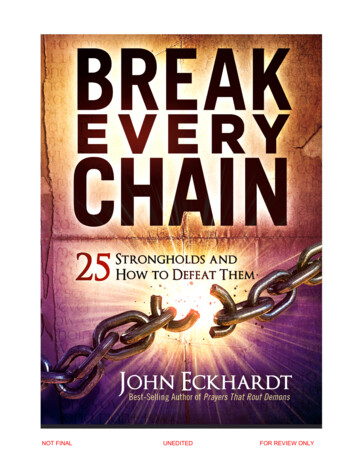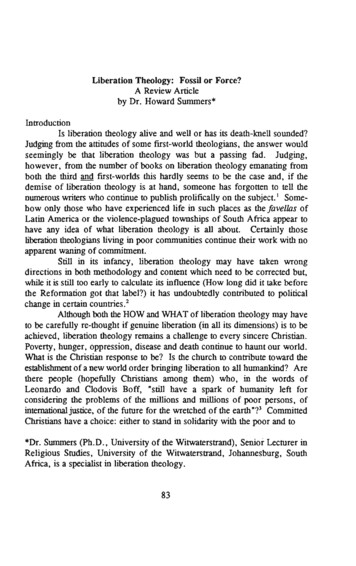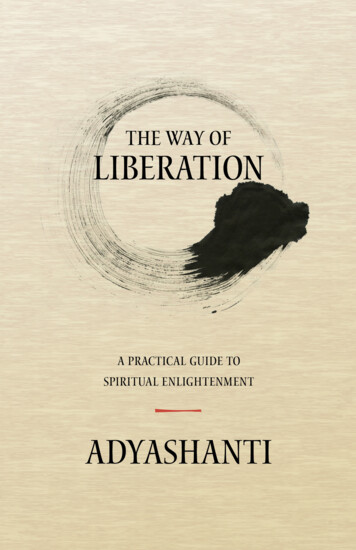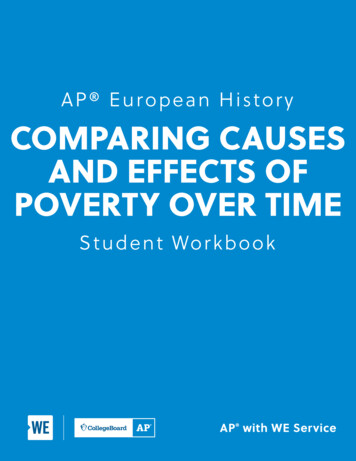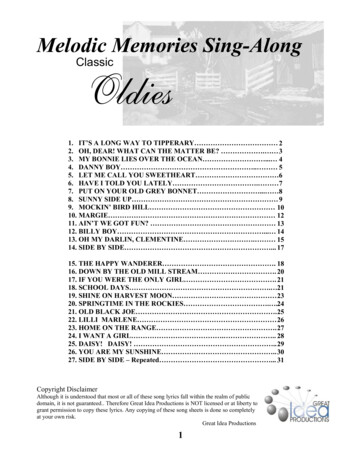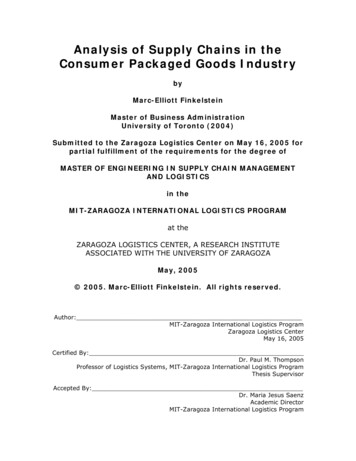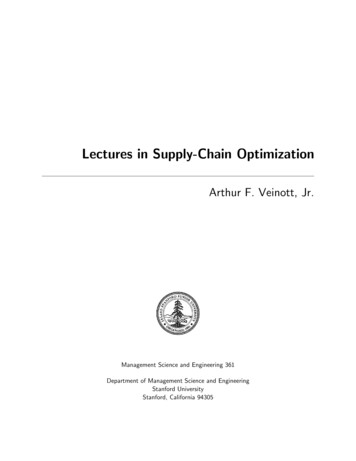
Transcription
The Long Chains of Liberation TheologyIntroduction“Two major evangelical organizations have formally endorsed principles that would addsexual orientation and gender identity (SOGI) to federal nondiscrimination law. The boards ofthe Council for Christian Colleges and Universities (CCCU) and the National Association ofEvangelicals (NAE) quietly passed similar motions in recent months, advancing a multiyeareffort they say is necessary to preserve religious freedom.”1Sincere efforts to preserve religious freedom may actually harm the Church. We mayshake our heads in wonderment at the apparent acquiescence to worldly ways. Similarlyoriented critics may call it “The Great Evangelical Sellout.”2 But those involved are insistentthat they are intent only on preserving some semblance of religious freedom for Christians.CCCU board member Shirley Mullen defended the action, “As Christian higher educators, weare increasingly persuaded that the most viable political strategy is for comprehensive religiousfreedom protections to be combined with explicit support for basic human rights for membersof the LGBT community.”3Changes come so rapidly, compromise is so common-place, voices are so vocal, that it isdifficult for us to develop a clear picture of the direction our country may be headed. Religiousfreedom deserves to be high priority for the leaders of Church. But compromise of sounddoctrine is not an effective strategy, not only because it denies the strength of God’s Word, butalso because it ignores forces that have long been at work to strip Christianity of religiousfreedom entirely. Those who compromise God’s Word in this way, not only risk their own faith,but also become pawns in the hands of those who would move Christianity outside theprotections of religious freedom. I hope to present, in this brief essay how that may happen.I. Liberation Theology - The FoundationIn 1973, a middle-aged Peruvian, Roman Catholic priest published a book that would seta new direction for much of Christianity, and lay the foundation for the shape of much of theChurch today. Gustavo Gutierrez is considered the primary architect of what is now known asLiberation Theology. In his book, A Theology of Liberation he went far beyond the activism ofthe Social Gospel Movement of the late 19th century. Gutierrez was not so much concernedwith getting Christians to act like Jesus by working to rid the world of social evils. His thesis wasa radical reorientation of the nature of the Church, and the meaning of the Gospel.He begins by reorienting the pursuit of theology. He writes that in the early centuries ofthe Church, theology was thought of as wisdom, which was characterized by spiritual life and1Derrick, J.C. “Board Backs SOGI Compromise” World Magazine December 12, 2018https://world.wng.org/2018/12/boards back sogi compromise2Welch, David “LGBT-driven 'Fairness for All' Adopted by Evangelical Organization” The Christian Post Monday,January 07, 2019 will-be-special-rights-for-a-few.html3Derrick1
separate from worldly concerns. From the twelfth century on, theology was thought of as ascience, an intellectual discipline that focused on orthodoxy. At present, he argues that theproper form of theology is to be focused on the practice of living the faith within the specificcontext of the believer.4This thought leads him to abandon the normal sources of authority, and ground thedevelopment of theology in the current circumstances of the world. “Instead of using onlyrevelation and tradition as starting points, as classical theology has generally done, it must startwith facts and questions derived from the world and from history.”5 As a result, the Pastors ofthe Church are not considered theologians by virtue of their study of God’s Word, but by theirwork toward liberating oppressed peoples. “The pastoral activity of the Church does not flowas a conclusion from theological premises. Theology does not produce pastoral activity; ratherit reflects upon it. Theology must be able to find in pastoral activity the presence of the Spiritinspiring the action of the Christian community.”6While he claims not to be interested in denying the meaning of orthodoxy, he ends bycastigating it as obsolete.Rather, the goal is to balance and even to reject the primacy and almost exclusivenesswhich doctrine has enjoyed in Christian life and above all to modify the emphasis, oftenobsessive, upon the attainment of an orthodoxy which is often nothing more thanfidelity to an obsolete tradition or a debatable interpretation. In a more positive vain,the intention is to recognize the work and importance of concrete behavior, of deeds, ofaction, of praxis in the Christian life.7Reflection on the situation of the poor leads to a "liberating praxis", where the Churchattempts to build the economic, spiritual and intellectual liberation of socially oppressedpeoples as fulfillment of the kingdom of God.8 So, Gutierrez writes,This is a theology which does not stop with reflecting on the world but rather tries to bea part of the process through which the world is transformed. It is a theology which isopen—in the protest against trampled human dignity in the struggle against the plunderof the vast majority of people, in liberating love, and in the building of a new, just, andfraternal society—to the gift of the Kingdom of God.9Further, he already sees a grand future for the work of the Church in this area. Thosewho live in poverty are beginning to recognize the forms of oppression visited upon them bythe wealthy. The Church need only guide them in proper forms of liberation.4Gutierrez, Gustavo. A Theology of Liberation. Orbis Books, Maryknoll, New York. 1973. Pp 4-6.Gutierrez, p. 126Gutierrez, p. 117Gutierrez, p. 1058https://en.wikipedia.org/wiki/Gustavo Guti%C3%A9rrez9Gutierrez. p. 152
A broad and deep aspiration for liberation inflames the history of mankind in our day,liberation from all that limits or keeps man from self-fulfillment, liberation from allimpediments to the exercise of his freedom. Proof of this is the awareness of new andsubtle forms of oppression in the heart of advanced industrial societies which offerthemselves as models to the under-developed countries.”10 (Emphasis added)In this key passage he seeks to build on established Roman doctrine.The encyclical, Populorum Progressio, [Pope Paul VI, March 26, 1967], goes a stepfurther. In a somewhat isolated text it speaks clearly of ‘building a world where everyman, no matter what his race, religion or nationality, can live a fully human life, freedfrom servitude imposed on him by other men or by natural forces over which he has notsufficient control.’11 (Emphasis added)And finally, he comes round to justifying his thoughts in terms of a biblical expression.‘For freedom Christ has set us free.’ (Gal. 5:1), St. Paul tells us. He refers here toliberation from sin insofar as it represents a selfish turning in upon oneself. To sin is torefuse to love one’s neighbors and, therefore, the Lord himself. Sin—a breach offriendship with God and others—is according to the Bible the ultimate cause of poverty,injustice, and the oppression in which men live. In describing sin as the ultimate cause,we do not in any way negate the structural reasons and the objective determinantsleading to these situations. It does, however, emphasize the fact that things do nothappen by chance and that behind an unjust struct there is a personal or collective willresponsible—a willingness to reject God and neighbor.12Because Gutierrez is a contextual theologian he is determined to see material poverty asthe dominant form of oppression at loose in the world. He develops his understanding ofspiritual or Christian poverty, the counter element to material poverty, on the basis of hisreading of Scripture, “ if material poverty is something to be rejected, as the Bible vigorouslyinsists, then a witness of poverty cannot make it a spiritual ideal.”13 In other words, he doesnot believe that Christians should live in or desire to live in material poverty. Rather,Poverty is an act of love and liberation. It has redemptive value Christian poverty hasmeaning only as a commitment of solidarity with the poor It is not a question ofidealizing poverty, but rather of taking it on as it is—an evil—to protest against it and tostruggle to abolish it. As Ricoeur says, you cannot really be with the poor unless you arestruggling against poverty Christian poverty, an expression of love, is solidarity with thepoor and is a protest against poverty.14 (Emphasis original)10Gutierrez, p. 27Gutierrez, p. 3412Gutierrez, p. 3513Gutierrez, p. 29914Gutierrez, p. 300113
Gutierrez, grounded in the Latin American experience of poverty, the context in whichhe lived every day, concludes that the true work of the Church and the proper pursuit oftheology is manifest in the “liberating praxis,” which seeks to throw off the shackles of thepractice of material poverty together with its structures and institutions. Of course, hisdedication to the “practice” of theology, and his willingness to see poverty as therepresentation of all sin, eliminates the understanding of Christ’s vicarious work of establishingforgiveness as the true work of the Church. That is a matter for another paper. The thesis ofthis essay is that Gutierrez has also laid a foundation for an understanding of the orthodoxChurch as the ultimate oppressor.II. Liberation Theology- ExpandedClearly, Gutierrez was focused on material poverty as the mother of all oppressions.Still, he did establish a goal for the church to work toward the “ liberation from allimpediments to the exercise of his freedom ” and he did express a desire that, “ every man,no matter what his race, religion or nationality, can live a fully human life, freed from servitudeimposed on him by other men ” These ideals did not escape the attention of the Church,Roman and otherwise.In the upheaval that characterized the end of the Vietnam war, everything seemed to beturned on its head. Institutions that had long been held in esteem by the general public(Government, Military, Industry, Church), were now suspect. At first the churches sawliberation theology as an accusation, as lumping them in with all the other oppressinginstitutions. However, over time, in their scramble to land on the right side of history, theRoman church and many main-line denominations saw liberation theology as a path towardmuch needed relevance.In a conversation with the Jesuits of Central America, at the January 2019 World YouthDay in Panama, Pope Francis walked back his previous Marxist interpretation of liberationtheology. His natural predisposition to the poor led him to say, “Today we old people laughabout how worried we were about liberation theology. What was missing then wascommunication to the outside about how things really were.”15 He means the leadership of thechurch was too isolated to know how much the poor were suffering.While the official “endorsement” was a long time in coming, it is not difficult to see theunofficial impact of liberation theology on the church. Resistance to oppression, not just of thepoverty kind, now sits on the throne as the raison d'être for a wide swath of the church. Recentdevelopments in the Roman church are mind-boggling.Condemned by the Vatican in 1984, liberation theology did not disappear. It mutated tosubtler pretexts for its premises and presuppositions. The old language of class strugglehas been recast into the more digestible—and clichéd—terms of sustainability. And inthe name of the church’s historic concern for the poor comes a relatively modern15Pope Francis ‘Put your lives at stake’ February 14, 2019 atstake/4
disdain for modernity . Under cover of deep ecology, liberation theology has come inout of the cold. And it is gunning to even the score between the industrial West and theThird World What we are now seeing is the triumph of a 60-year-old plan, thesuccessful execution of a well-thought out plan to bring a new sort of thinking into theheart of the Church, a thinking rooted in elements of Liberation Theology 16The oppression of the earth may be the latest fad to enliven the church, but it joins along line of contenders. The list of oppression du jour includes: race (which took on its own lifein one form as “Black Liberation Theology”); gender (at first in the form of feminism, later asthe “Me Too” movement, then for homosexual behavior, and today for the trans-genderphenomenon); religion (particularly in America in favor of Muslims); and ethnicity (with itscurrent expression of care for the Latin American immigrant).This list is, of course, not exhaustive. A church that has jettisoned the gospel is notabove grasping at straws. No oppression is too small. Thus, some churches seem to be on theprowl for some vile oppression to oppose, be it of whales or seals, of abortive mothers or thosewho want to kill themselves, of Kurds, Albinos, Native Americans, or the domestically abused.Oppression is a reality in a sinful world. There are plenty of good causes, to be sure, and I amnot suggesting that the Church has a stellar record regarding true oppression. But as asubstitute for the true Gospel of Jesus, the elimination of oppression is destructive to theChurch.Recently the ELCA publicly joined the fray of oppression opposers when it declared itselfa sanctuary church. In the words of its own press release, “In a key action this afternoon, the2019 ELCA Churchwide Assembly voted to approve a memorial that declares the ELCA asanctuary church. The ELCA is the first North American denomination to declare itself asanctuary church body. As a sanctuary church the ELCA is committed to serving and supportingmigrant children and families in communities across the country.”17 Paul Egensteiner, theBishop of the Metropolitan New York Synod summarized the action, "I am thrilled to be part ofthe sanctuary initiative. The ELCA has long been one of the most welcoming denominations,and we look forward to broadening this initiative on a national scale, much like we have donewith our efforts in the LGBTQIA community, and our efforts surrounding racism awareness,domestic violence training, and inclusion and protection of women and children."18Numerous Christian confessions have succumbed to the Liberation Theology virus,busying themselves with eliminating various cultural oppressors. Those who hew to thetraditional understanding of oppression, that of sin, death and the devil are left holding the bagof cultural oppressions as if it belonged to them. Herein lies the problem. Those who areunwilling to endorse combatting the more culturally unacceptable forms of oppression as theirmarching orders immediately become suspect. If they attempt to argue against efforts toeliminate certain oppressions, on religious grounds, for example SOGI laws, or rights for those16Maureen Mullarkey, “Vatican’s Amazon Synod Uses Third World As Totems Of Marxist Revival” The Federalist,August 29, 2019 5
desiring to abort their children, they are labeled haters, and worse, oppressors. When thathappens, rights to religious freedom are sure to fall.III. Liberation Theology- Applied to BindLiberation theology, recognized or not, has a long reach. Its chains stretch out to bindthe Christian Church in the United States of America today. To many, the loss of religiousfreedom for the Christian Church, or at least certain segments thereof, is unthinkable. Theskirmishes involving individuals whether bakers, florists, or photographers who have desired tolive their faith in the public arena, while bothersome, have not found principle to remove thelong-cherished freedom wholesale. Perhaps it will never be found. Or perhaps the other shoehas yet to drop.That shoe may show up by means of a rewrite of the history of the Church. The wantonrewriting of history is not without precedent. In fact, the New York Times has launched arecent effort to do just that.The 1619 Project is a major initiative from The New York Times observing the 400thanniversary of the beginning of American slavery. It aims to reframe the country’shistory, understanding 1619 as our true founding, and placing the consequences ofslavery and the contributions of black Americans at the very center of the story we tellourselves about who we are.19Reframing American history, to achieve an “oppressors versus the oppressed” hue tonot only the beginning of the nation but to every subsequent action is actually a much moredaunting task than presenting certain portions of the Church in that light. Textbooks arealready in place to teach American history this way. “The central message of Howard Zinn’spopular textbook ‘A People’s History of the United States’ is the Marxist narrative of‘oppressed’ versus ‘oppressor.’”20 Can textbooks castigating Christianity as an oppressive forcebe far behind?There are voices that have begun to adopt this narrative. “When Europeans ‘founded’America, they took any land that wasn’t ‘Christian’ and claimed it ‘for God’ — which meant thatthey were given full reign by the church to decide who looked saved and who didn’t. TheDoctrine of Discovery gave them full permission to oppress ”21 There is little doubt that theChurch made errors with regard to its treatment of Native Americans. But to say that itoperated with “full permission to oppress” paints an entirely different picture of /08/14/magazine/1619-america-slavery.html20Lawson, Joshua “No, America Wasn’t Built on Slavery” The Federalist August 21, ca-wasnt-built-slavery-faith-men-createdequal/?utm source The Federalist List&utm campaign 42ab069118RSS The Federalist Daily Updates w Transom&utm medium email&utm term 0 cfcb868ceb-42ab06911883987381&fbclid IwAR2wF4BcNcvGw33uOO1WOm EUGlfY0TLSV 0ZblS4Dl QGWLAPS9TRafDEc21Curtice, Kaitlin “When the Church Uses God’s Name to Oppress” Sojourners, March 5, -s-name-oppress6
Likewise, with regard to slavery, the Church is being called the oppressor.The introduction of “Christianity” into what we now call ‘North America’ was genocidalby nature. The religion was offered to indigenous tribes and African slaves as the onlyalternative to being killed, and they were often enslaved and killed anyways. Peoplewere bought and sold and raped and abused. Land was stolen. Countless lives wereruthlessly destroyed by people who claimed to follow the ‘Prince of Peace.’ This washow Westernized Christendom was built: violently and as a weapon to help establishwhite-dominated social structures of colonial rule.22This, of course, was not how Westernized Christendom was built, but the narrativeexists, and is appealing to those who would limit or remove some of the freedoms the Churchhas enjoyed in this country. In this scenario, the various incidents of Christians in America whohave been taken to court over their desire to speak their faith in the public arena begin to lookless isolated, and more like attempts to find a method to muzzle Christians.Indeed, that was the conclusion of the New Mexico Supreme court in the case of aChristian photographer, Elaine Huguenin, who declined to photograph a homosexual wedding.“The New Mexico Supreme Court ruled on August 22, 2013 against Jonathan and Elaine. One ofthe justices said that the Huguenins are ‘now are compelled by law to compromise the veryreligious beliefs that inspire their lives,’ and he declared that this compulsion ‘is the price ofcitizenship.’”23 The United States Supreme Court declined to hear the appeal of this case.If and when, a certain segment of the Christian Church is declared an oppressiveinstitution, the elimination of its freedom, at least with regard to those areas of oppression,(most likely abortion, euthanasia, and gender issues), is a foregone conclusion.There is precedent in other countries. A story out of Chile is ominous. A teacher ofCatholic doctrine at a Chilean school, Ms Pavez, entered into a public homosexual relationshipand refused to repent. The Roman Church moved to revoke her certification to teach religiondue to her violation of Church doctrine and the public scandal it caused. She appealed to theInter-American Human Rights Commission based in Washington, D.C., and the Inter-AmericanCourt of Human Rights based in San José, Costa Rica.The Commission issued three major recommendations to Chile. First, that it shouldreinstate Ms. Pavez to her former post as a religion teacher, regardless of her lack ofaptness in the eyes of the Church. Second, that it should reform the existing legislationthat had allowed the Church to revoke her certificate, so that it would no longer beapplied in a “discriminatory” manner. And third, that the State had to “train” thosepersons in charge of assessing the aptness of the teachers―in this case, the bishops ofthe Catholic Church―in the scope and content of the principle of equality and nondiscrimination, especially its protection of sexual orientation. Put another way, the2223Mattson, Stephen, “The White Church has been a Steady Oppressor. Sojourners. October 17, 2018.Alliance Defending Freedom, /elane-photography-v.-willock7
Commission is calling on the state to “re-educate” the bishops on sexuality anddiscrimination, in order to make them fall in line with its agenda.24It appears that the “oppressor vs the oppressed” narrative is gaining traction as amethod of limiting Christian speech.ConclusionLiberation Theology has affected the way that many people, both Christian and nonChristian think about the work of the Church. For all its vaunted promise, its legacy is to bindthe freedom of the faithful Christian Church. Those who have adopted the elimination ofoppression as their gospel may think they have found both a good cause and a means ofsurvival. Their politically-correct position also plays into the hands of those who do not want tohear the pure Gospel. If the Liberation-favoring church gains the political favor necessary to bethought of as the “true Christian church,” then the rest of the Church can be thought of as anoppressive sect. If that becomes true, then many means will be found to oppress the oppressorand limit his freedom.Many within the Church have occupied themselves with fighting for religious freedom.Within the American experience this is a good and viable expression of citizenship. However,two cautions may be in order. First, it is a mistake to compromise the true doctrine as apolitical pawn in the pursuit of freedom. This tactic will not end well. Once severed from thelifeblood of the pure Word that church will not endure. Furthermore, such a compromiseallows the rest of the Church to be labeled in ways that may jeopardize its freedom.Second, the Church should prepare to lose this fight. Should the state move to limithow the Church can speak about gender, abortion or euthanasia issues it would be well for theChurch to steel itself to a proper response. Our words, our actions, cannot effect freedom.True freedom is a Divine prerogative. Only He who is perfectly free, and who came into thisworld to grant freedom, can truly set you free. And when He sets you free, despite whateverchains the state may place on you, you are free indeed.There may come a time when we are called to hate religious freedom lest its pursuitharm our faith. But now is a good time to count the cost. (Luke 14:27-28) Do not despair, forthe Father granted you the kingdom. So, the Church stays the course, holds fast the confession,speaks the truth of God’s Word, not in pursuit of freedom of religion, but from within thefreedom its victor grants.S.D.G.Terry ForkeMontana/Wyoming Winkel Conference9/10/1924Henriquez, Tomas. “A Storm in Brewing in the Americas” Public Discourse- The Journal of the WitherspoonInstitute. August 12, 2019 https://www.thepublicdiscourse.com/2019/08/55749/8
Gutierrez, grounded in the Latin American experience of poverty, the context in which he lived every day, concludes that the true work of the Church and the proper pursuit of theology is manifest in the liberating praxis, which seeks to throw off the shackles of the practice of material povert
